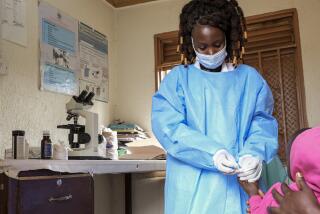AIDS Called ‘Most Serious Epidemic in Last 50 Years’
- Share via
AIDS “now ranks as the most serious epidemic of the last 50 years,” an international group of researchers declared in a report that urges global cooperation to head off the spread of the deadly acquired immune deficiency syndrome.
Noting that several million people around the world now are infected with the AIDS virus, the researchers called for “a major international commitment, not only in terms of providing financial help but also in providing scientific, educational and technical assistance.”
Between 10% and 30% of those infected with the virus are expected to develop the disease within the next five to 10 years, according to the report, published today in Science magazine.
“Worldwide cooperation is now a necessity,” the researchers wrote.
Barrage of Exhortations
Their report is the latest in a recent barrage of exhortations for more public health efforts to combat the spread of AIDS.
In Washington earlier this month, U.S. Surgeon General C. Everett Koop and the Institute of Medicine separately urged that AIDS education be implemented as quickly as possible in the schools.
Cases of AIDS now have been identified in 74 countries, including more than 25,000 cases in the United States, 3,000 in Europe, nearly 3,000 in other countries in the Americas, and many thousands in Africa, according to Dr. Thomas C. Quinn of Johns Hopkins University Medical Center, principal author of the report.
The study was prepared in conjunction with officials of the World Health Organization in Geneva and the U.S. Centers for Disease Control in Atlanta.
It focused on the “major health problem” caused by AIDS in Africa, where many researchers believe the AIDS virus originated.
Millions of Africans Infected
With estimates of “several million” Africans infected with the AIDS virus, Quinn and his co-authors said they fear that the disease may overwhelm the limited medical resources of many African countries.
For example, they point out that screening blood to prevent AIDS virus transmission would likely cost “approximately 30 times the annual per capita health budget” in many of the countries. Such an effort in the United States last year cost about $60 million--an amount that is, they noted, “many times greater than the entire health budgets of many African countries.”
Furthermore, they added: “The costs of caring for 10 AIDS patients in the United States (about $450,000) is greater than the entire budget of a large hospital in Zaire, where up to 25% of the pediatric and adult hospital admissions have (AIDS virus) infection.”
The report called for creation of national committees in African countries to coordinate public health efforts against the spread of AIDS--a proposal that is being discussed this week at a World Health Organization meeting in Brazzaville, Congo.
Particular Problem in Africa
AIDS attacks the body’s immune system, leaving an infected individual vulnerable to a variety of life-threatening infections and tumors. The increased susceptibility to infection is a particular problem in Africa, where anemia, malnutrition and infectious diseases such as tuberculosis and malaria are common.
“Unless there is an international commitment of will and financial resources, AIDS will continue to spread throughout Africa and the world,” warned Quinn and his co-authors, Dr. Jonathan M. Mann of the World Health Organization, Dr. James W. Curran of the Centers for Disease Control and Dr. Peter Piot of the Institute of Tropical Medicine in Antwerp, Belgium.
More to Read
Sign up for Essential California
The most important California stories and recommendations in your inbox every morning.
You may occasionally receive promotional content from the Los Angeles Times.










